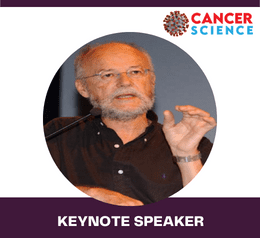Scholars World Congress on
Cancer Research and Oncology
THEME: "Frontiers in Cancer Research and Oncology"
 14-15 Nov 2022
14-15 Nov 2022  TIME Asma Hotel, Albarsha | Dubai, UAE & Online (Hybrid event)
TIME Asma Hotel, Albarsha | Dubai, UAE & Online (Hybrid event) THEME: "Frontiers in Cancer Research and Oncology"
 14-15 Nov 2022
14-15 Nov 2022  TIME Asma Hotel, Albarsha | Dubai, UAE & Online (Hybrid event)
TIME Asma Hotel, Albarsha | Dubai, UAE & Online (Hybrid event) 
University Cote d’AZUR-CNRS-Inserm (IRCAN) and Centre A. Lacassagne, France
Title: Fermentative Glycolysis controls cancers, pathogens growth and immunity - Genetic deconstruction
Jacques Pouyssegur, CNRS Research Director Emeritus, graduated from an Engineering School in Biochemistry of the University of Lyon, where he obtained his PhD in 1972. He spent two years as a post-doctoral scientist at the National Cancer Institute of NIH (USA) and established his own research group in 1978 at the CNRS Biochemistry Centre of the University of Nice.
Jacques Pouyssegur has previous experience in bacterial and somatic cell genetics, metabolism, Na-H exchanger, pH regulation, G protein-coupled receptors and MAP kinase signaling in the context of growth control in mammalian cells. In the last 25 years his group developed a strong interested in hypoxia signaling, oxygen and nutrient sensing, angiogenesis, autophagy, amino-acid transporters, oxidative stress, cancer metabolism, Warburg effect and immune-suppression. He is member of AACR, EMBO, the French and European Academy of Sciences and the past President of the International Advisory board of the National Cancer Institute.
The evolution of life from extreme hypoxic environments to an oxygen-rich atmosphere has progressively selected for successful metabolic, enzymatic and bioenergetic networks through which a myriad of organisms survives. First we will discussed how fermentative glycolysis, an ancient evolved metabolic pathway, is exploited by rapidly growing tissues, tumors, immune cells, but also viruses and bacteria during infection. The ‘Warburg effect’ activated via Myc and HIF-1 in response to growth factors and hypoxia is an essential metabolic and energetic pathway which satisfies nutritional and energetic demands required for rapid genome replication. Second, we will present the key role of lactic acid, the end-product of fermentative glycolysis able to move across cell membranes in both directions via monocarboxylate transporting proteins (i.e., MCT1/4) contributing to cell-pH homeostasis but also to the complex immune response via acidosis of the tumor microenvironment. Importantly lactate is recycled in multiple organs as a major metabolic precursor of gluconeogenesis and energy source protecting cells and animals from harsh nutritional or oxygen restrictions. Third, we revisit the Warburg effect via CRISPR-Cas9 disruption of glucose-6-phosphate isomerase (GPI-KO) or lactate dehydrogenases (LDHA/B-DKO) in two aggressive tumors (melanoma B16-F10, human adenocarcinoma LS174T). Full suppression of lactic acid production reduces but does not suppress tumor growth due to reactivation of OXPHOS. In contrast, disruption of the lactic acid transporters MCT1/4 suppressed glycolysis, mTORC1, and tumor growth as a result of intracellular acidosis. Finally, we will briefly discuss the current clinical developments of an MCT1 specific drug AZ3965, and the recent progress for a specific in vivo MCT4 inhibitor, two drugs of very high potential for future cancer clinical applications.